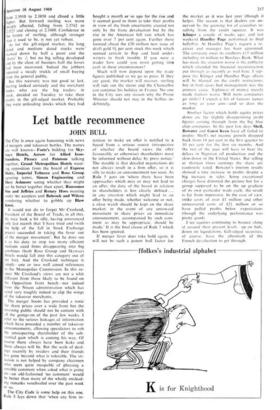Let battle recommence
JOHN BULL
The City is once again humming with news of mergers and takeover battles. The names are well known—Forte's bidding for Sky- ways Hotels, Acrow for Allied Iron- founders, Plessey and Paintom talking together, Grand Metropolitan Hotels meet- ing opposition from the board of Express Dairy, Imperial Tobacco and Ross Group agreeing terms, Simon Engineering and Davy Ashmore seeing whether they might not be better together than apart, Ransomes Sim and Jeffries and Rotary Hoes meeting under utc auspices and Babcock and Wilcox wondering whether to gobble up Blaw Knox.
It would not do to forget Mr Crosland, President of the Board of Trade, in all this. He may look a bit silly, having announced only last month that 'I have tried and (with the help of the fall in Stock Exchange prices) succeeded in taking the fever out of the merger movement'. But he does see it as his duty to stop too many efficient medium sized firms disappearing into big combines (both Ross Group and Skyways Hotels would fall into this category out of my list). And the Crosland technique is simple—one or two well aimed references to the Monopolies Commission. In this re- spect Mr Crosland's views are not a whit different from those likely to be found on the Opposition front bench—nor indeed from the Nixon administration which has acted very toughly indeed to clip the wings of the takeover merchants.
The merger boom has provided a tonic for share prices over a wide front but the investing public should not be content with all the goings-on of the past few weeks. I refer to the serious leakages of information which have preceded a number of takeover announcements, allowing speculators to rob the unsuspecting shareholder of the sub- stantial gain which is coming his way. Of course there always have been leaks and there always will be. But the scale of deal- ings recently by insiders and their friends has gone beyond what is tolerable. The sit- uation is not helped by company chairmen who seem quite incapable of phrasing a sensible comment when asked what is going on—an old-fashioned `no comment' would be better than many of the wholly mislead- mg remarks vouchsafed over the past week or so.
The City Code is some help on this one. Rule 5 lays down that 'when any firm in- tention to make an offer is notified to a board from a serious source (irrespective of whether the board views the offer favourably or otherwise) shareholders must be informed without delay by press notice.' The trouble is that detailed negotiations do not always result in a firm offer, so it is silly to make an announcement too soon. As Rule 5 goes on 'where there have been approaches which may or may not lead to an offer, the duty of the board in relation to shareholders is less clearly defined ... in any situation which might lead to an offer being made, whether welcome or not, a close watch should be kept on the share market; in the event of any untoward movement in share prices an immediate announcement, accompanied by such com- ment as may be appropriate, should be made.' It is the final clause of Rule 5 which has been ignored.
If merger fever does take hold again, it will not be such a potent bull factor for
the market as it was last year (though it helps►. The reason is that dealers are un- nerved by the growing list of casualties re- sulting from the credit squeeze. It was Klinger a couple of weeks ago; and last weekend Handley Page performed its final bellyflop. At Handley Page's request a re- ceiver and manager has been appointed. The company owes its creditors I:13 million including I:6 million to Barclays Bank. What has made the situation worse is the publicity which attended the financial reconstruction put through as recently as mid-June. 1 sup- pose the Klinger and Handley Page affairs will he blamed on the credit restrictions. but in both cases bad management was the primary cause. Tightness of money merely made matters worse. Will more companies go under? I expect a list of famous names as long as your arm—and so does the market.
Another factor which holds equity prices down are the slightly disappointing profit figures coming through from the big blue chip companies In the past few days Shell, Bowater and Guest Keen have all failed to inspire. Shell's net income growth dropped back from 14 per cent in the first quarter to 10 per cent for the first six months. And the rest of the year will have to hear the delays in Nigerian oil production and the slow-down in the United States. But selling at thirteen times earnings the share are cautiously rated. Bowater's interim results showed a tiny increase in profits despite a big increase in sales. Some exceptional charges have distorted the picture but for a group supposed to be on the up gradient of its own particular trade cycle, the result is far from impressive. In the case of GKN, strike costs of over £1 million and other unrecovered costs of £2-1 million or so have pulled profits below expectations (though the underlying performance was pretty good).
I see equities continuing to bounce along at around their present levels --up on bids, down on liquidations. Gilt-edged securities, of course, have the aftermath of the French devaluation to get through.
ffolkes's industrial alphabet
K is for Knighthood


































 Previous page
Previous page